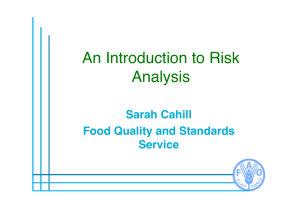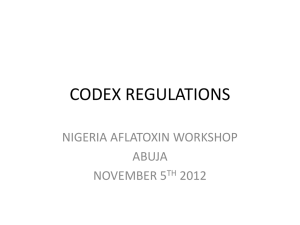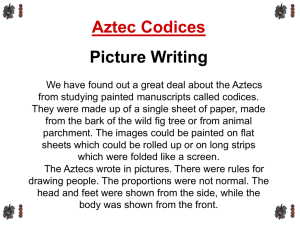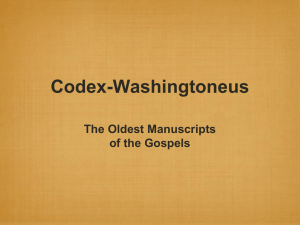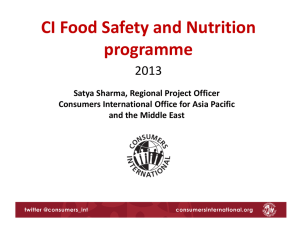35th SESSION OF THE JOINT FAO/WHO CODEX ALIMENTARIUS COMMISSION 2 JULY
advertisement
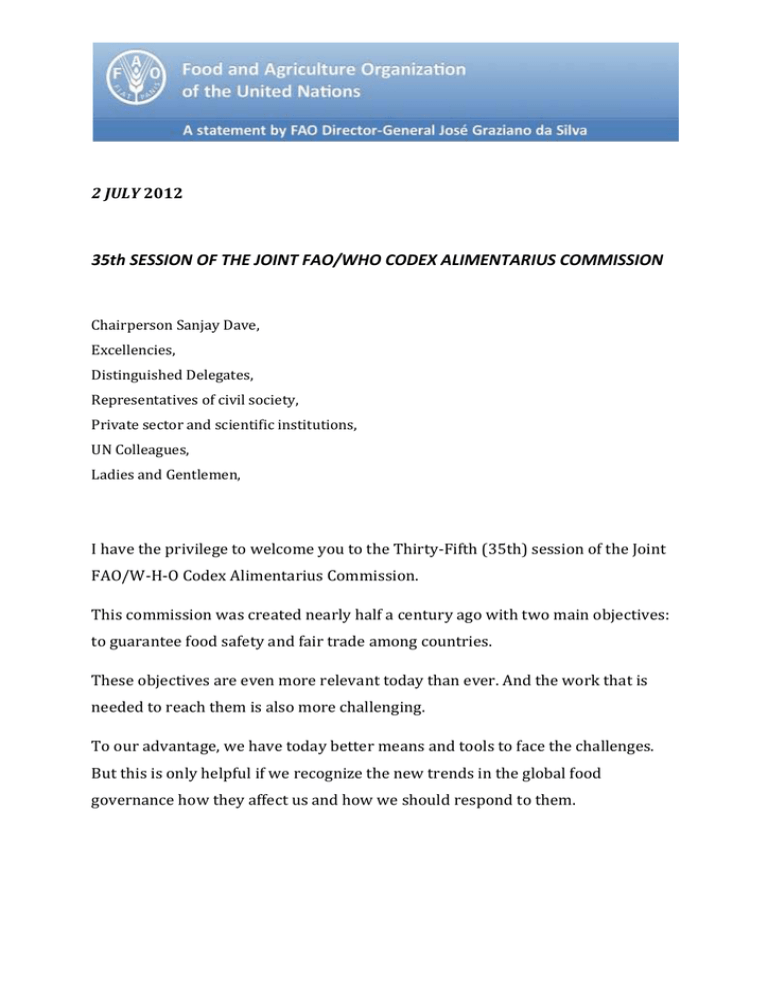
2 JULY 2012 35th SESSION OF THE JOINT FAO/WHO CODEX ALIMENTARIUS COMMISSION Chairperson Sanjay Dave, Excellencies, Distinguished Delegates, Representatives of civil society, Private sector and scientific institutions, UN Colleagues, Ladies and Gentlemen, I have the privilege to welcome you to the Thirty-Fifth (35th) session of the Joint FAO/W-H-O Codex Alimentarius Commission. This commission was created nearly half a century ago with two main objectives: to guarantee food safety and fair trade among countries. These objectives are even more relevant today than ever. And the work that is needed to reach them is also more challenging. To our advantage, we have today better means and tools to face the challenges. But this is only helpful if we recognize the new trends in the global food governance how they affect us and how we should respond to them. In order to take into account this, I started a Strategic Thinking Process at FAO as soon as I took up office in January. It involves consultation inside and outside the Organization and is defining the future strategic direction of FAO. In this process, we first identified eleven trends and seven global challenges in the areas of food security and agriculture. Then, considering these trends and challenges and based on FAO’s core functions, and comparative advantages, we proposed five strategic objectives to focus our future work. They are: • First, eradicate hunger, food insecurity and malnutrition. • Second, increase food production in an economic, social and environmentally sustainable manner. • Third, improve the livelihood of rural populations, in particular women and youth, through enhanced employment opportunities and increased access to production resources. • Fourth, enable more inclusive and efficient agricultural and food systems at local, national, regional and international levels. • And, fifth, increase the resilience of rural livelihoods to threats and crises. The Codex Alimentarius gives important contributions to these objectives. We cannot eradicate hunger without having safe and nutritious food and fair practices in the global trade. Food safety crises can cause unnecessary hardships. And changes in production have important implications for food safety and quality. Alongside this strategic thinking process, we are in an institutional strengthening process to improve the translation of FAO’s normative and standard setting work into more concrete results at country and global levels. The Codex Alimentarius has assumed greater importance as is evident from the role it plays in international trade. This has become even more significant since the World Trade Organization referenced it in its Sanitary and Phytosanitary Agreement. Ladies and gentlemen, Participation is at the core of how this Commission works. For FAO and W-H-O, and for the nature of Codex work, inclusiveness, universality and transparency are essential principles to be considered when debating and making decisions. Today, over 180 governments are members of the Codex. And over 200 intergovernmental, non-governmental and international organizations are observers to the Commission and its subsidiary bodies. They represent civil society, consumers, private sector, research institutions and academia, among others. The Codex has set an example for inclusiveness that has inspired the participation of civil society in other FAO forums. There is no doubt also that developing countries are now much more engaged in Codex than 20 years ago. The FAO/W-H-O Trust Fund for Enhanced Participation in Codex is financed with voluntary contributions from donors. In this respect, I would like to congratulate and welcome India for its recent decision to join the Group of Codex Trust Fund contributors, becoming the first developing country to do so. However, much still remains to be done. And participation of developing countries still needs to be improved. It is essential to preserve and enhance the multilateral nature and the legitimacy of Codex. When discussing ways to do this, it may be noted that the Codex trust fund is a project with a limited life span. It ends in 2015. It will be important to ensure sufficient funding for the Commission’s and the Executive Secretariat’s functions and for scientific research, and an adequate budget will help maintain and assert this independence. While participation increases legitimacy, it also adds to the challenge of agreeing on food safety standards. Finding consensus is not always an easy task. Some standards are put on hold at the final step because of a lack of consensus. I urge you to address the underlying issues always keeping in mind that you are working to protect consumers’ health and ensure fair practices in food trade. Setting standards is a prerogative of governments, who are primarily responsible for the health of their citizens. The Commission guarantees extensive consultations, assures that different opinions and evidences are analyzed and discussed before taking decisions. The Codex Alimentarius Commission has an open, transparent, inclusive and member driven process. This is something we should be proud of. However, this sometimes results in a drawn out process that is, in some ways, out of sync with the need for quick solutions. This contributes to the proliferation of private standards, that may respond to the need for speed, but do not have the legitimacy of public standards. The imposition of private standards in fact undermines all efforts done in multilateral agreements like Codex. Next year, the Codex Alimentarius celebrates its Fiftieth (50th) anniversary. Let’s use this occasion to promote Codex and Food Safety activities as the only acceptable forum of negotiation of international standards for food safety. Ladies and gentlemen, A lot of work lies before you this week – let me close by assuring you that FAO will continue to provide Codex with the support it requires to fulfil the tasks in the way that you – the Members – expect and that consumers and farmers around the world need. I thank all of you for your continued dedication to Codex and I wish you a successful meeting. Thank you very much.
